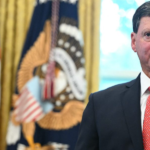The federal government is on pace to reap a significant amount of revenue from President Donald Trump’s tariffs, but they may not be a reliable source of funding, especially in a recession, according to Moody’s Analytics chief economist Mark Zandi.
Though that’s not nearly enough to eliminate the federal budget deficit, which is expected to widen to almost $2 trillion this year, it’s still a meaningful amount. So why not rely on them as a long-term revenue source?
In addition, the so-called reciprocal tariffs are facing court challenges on the argument they’re not covered under the International Emergency Economic Powers Act.
As a result, Zandi cautioned against making other tax and spending decisions based on the assumption those tariffs will remain in place. And if the economy goes south, then all bets are off.
“I suspect that the next time the economy gets into recession—and it will, maybe not this go around, but at some point it will—whoever’s president is going to be under significant pressure to cut those tariffs because they can do it under executive order. They don’t need to go to Congress to get a piece of legislation,” he added.
“There’s going to be a strong incentive on that president’s part to say, ‘Okay, I’m going to cut the taxes,’” Zandi told the Concord Coalition’s Carolyn Bourdeaux and Robert Bixby.
While Trump has floated the idea of using tariff revenue to provide some kind of dividend or rebate to Americans, the White House insists consumers are not shouldering tariff costs and that foreign exporters are.
Either way, Zandi said he thinks it’s highly unlikely that tariffs will generate $300 billion a year over the next decade and warned against counting on a windfall like that.
“In fact, if you did do that, we’re setting ourselves up for an even more dire, darker fiscal situation down the road, because I just don’t think those tariffs are going to be around 10 years from now,” he added.









